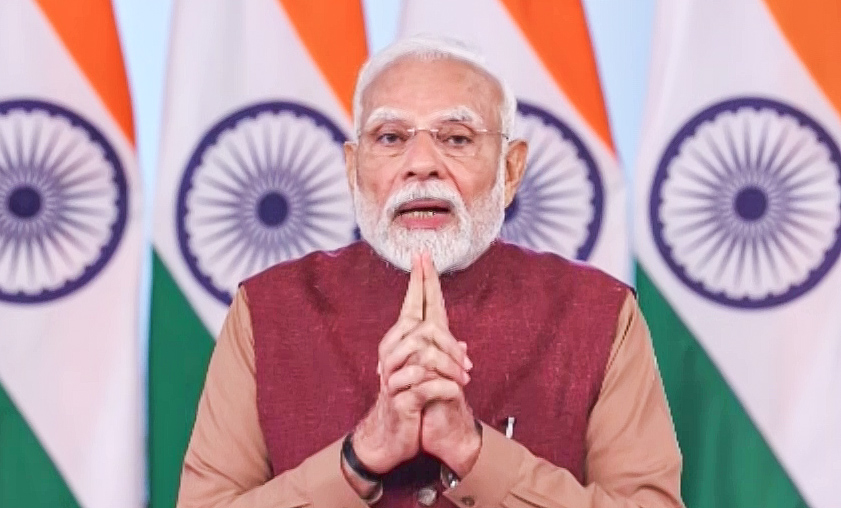Prime Minister Narendra Modi on Thursday commended Union Minister Jagat Prakash Nadda’s detailed explanation during the Operation Sindoor debate in the Rajya Sabha, asserting that the BJP-led central government responded to the Pahalgam terrorist attack with full resolve and clarity.
In a post on X, PM Modi said, “Our government has responded to the terrorist attack in Pahalgam with full determination and resolve. Giving utmost priority to national security, J.P. Nadda ji elaborately explained in the Rajya Sabha how Operation Sindoor succeeded in achieving its objectives.”
In a separate post, PM Modi also lauded Amit Shah’s address in the Rajya Sabha, “A phenomenal speech by Home Minister Amit Shah Ji in the Rajya Sabha. He categorically expressed our Government’s point of view on key aspects relating to national security, uprooting terror networks, and the success of Operation Sindoor.”
Addressing the Upper House during the Operation Sindoor debate, Leader of the House JP Nadda drew a bold contrast between the 2004–2014 period and the post-2014 era, highlighting what he described as India’s “robust transformation” in terms of national security, military response, and political will.
“Operation Sindoor was executed with precision and power,” he said. Nadda informed the House that nine terrorist camps—including those in Bahawalpur, Sialkot, and Muzaffarabad—were destroyed in just 22 minutes. The masterminds of the Pahalgam terror attack, he added, were neutralised through coordinated strikes under Operation Mahadev and Operation Sindoor. Major terror hubs such as Lashkar-e-Taiba, Jaish-e-Mohammed, and Hizbul Mujahideen were “decisively dismantled.”
Nadda, who also serves as BJP’s national president, said these actions demonstrate India’s operational strength. For the first time, under the Modi government, India has unequivocally declared to the world that “terrorism and dialogue cannot go hand in hand.”
He also took aim at the previous UPA regimes, alleging a lack of will to combat terrorism between 2004 and 2014. During that period, he said, India witnessed 7,217 terror incidents. In contrast, between 2015 and 2025, that number dropped to 2,150 – a reduction of 85%. Civilian deaths fell by 70% (from 1,770 to 357), while terrorist casualties rose by 123%.
“Stone-pelting incidents in Kashmir, which stood at 2,654 annually before 2014, have now come down to zero. Valley shutdowns, once over 130 days a year, are now non-existent,” Nadda told the House. “The Army, the police, and the forces remained the same—the difference is political leadership,” he said.
He also listed a series of major terror attacks that occurred during Congress-led governments—Jaunpur (2005), Varanasi (2006), Mumbai, Delhi, Ahmedabad, and the 26/11 Mumbai attacks in 2008. Despite these events, Nadda alleged, the Congress-led governments continued with trade pacts, confidence-building measures, and cultural exchanges with Pakistan.
“There was no swift retaliation,” he added. “Instead, India offered biryani, visas, and better trade ties while bombs exploded in Indian cities. Sweets were piled while bullets streamed. Trade soared. They served biryani, we bled,” said Nadda.
Under the Modi government, however, India responded with decisive military action, Nadda asserted. “Three days after the Uri attack in 2016, surgical strikes destroyed terror launchpads. Eleven days after Pulwama in 2019, the Balakot airstrike sent a clear message. Thirteen days after the Pahalgam massacre in 2025, Operation Sindoor delivered precise strikes on airbases and terror camps—with zero civilian casualties,” he said.
Nadda further highlighted India’s growing self-reliance in defence. Indigenous systems like BrahMos, Pinaka, radars, and artillery were used during the operation. India’s defence manufacturing self-reliance increased from 32% in 2014 to 88% in 2025, he noted.
“No terrorist survived. No civilian was harmed. This is full-moon India—decisive, transparent, and fearless leadership,” Nadda declared.
He also pointed to the strong international support India received after the Pahalgam attack. “Sixty-one global leaders, including heads of state and foreign ministers, condemned the attack. The United Nations Security Council, QUAD, BRICS, the EU, France, Germany, and others extended full backing,” he said.
“Today, international experts see India as a global defence model, praising our domestic military manufacturing and strategic autonomy,” Nadda concluded.
(With inputs from IANS)














